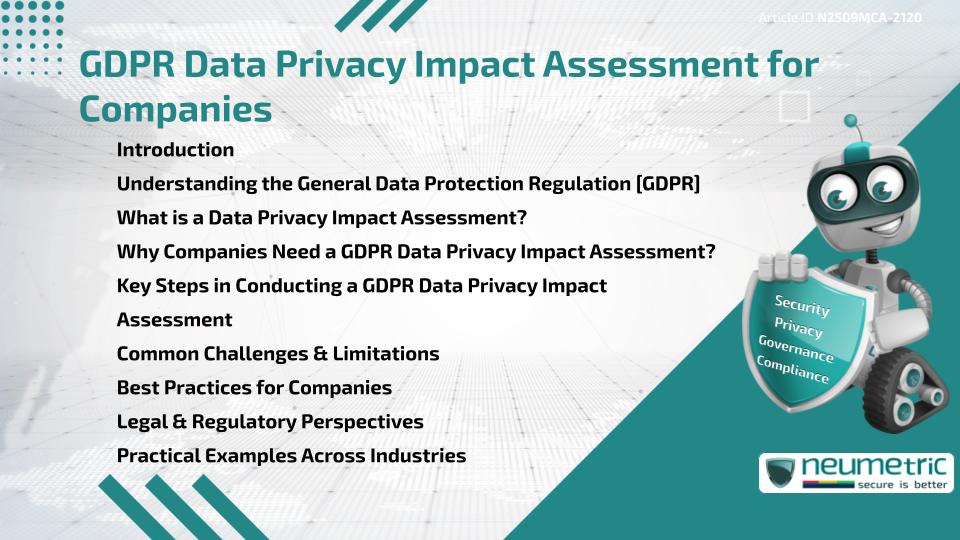Table of Contents
ToggleIntroduction
A GDPR Data Privacy impact Assessment is a structured process that helps companies identify & reduce Risks related to handling Personal Data. It is a key requirement under the General Data Protection Regulation [GDPR] to ensure compliance when processing Sensitive Information. Companies that conduct this Assessment benefit from stronger trust with customers, reduced chances of legal penalties & improved Data Protection practices. This article explains the importance of a GDPR Data Privacy impact Assessment, the steps involved, common challenges & Best Practices for companies across industries.
Understanding the General Data Protection Regulation [GDPR]
The GDPR is a European Union law designed to protect individuals’ Personal Data & Privacy. It applies to all companies that process Personal Data of EU residents, regardless of where the company is located. The Regulation emphasises transparency, accountability & the need for Organisations to handle data responsibly. One of its most important tools is the GDPR Data Privacy impact Assessment, which helps Organisations measure the potential impact of data processing activities on individuals’ rights.
What is a Data Privacy Impact Assessment?
A Data Privacy Impact Assessment, often called a Privacy Impact Assessment [PIA], is a systematic evaluation of how a data processing activity may affect Privacy. It involves identifying Risks, assessing their severity & implementing measures to minimise them. Think of it as a safety inspection before opening a new building — the aim is to spot issues before they cause harm.
Why Companies Need a GDPR Data Privacy Impact Assessment?
Companies are legally required to perform a GDPR Data Privacy impact Assessment when processing activities are likely to pose high Risks to individuals. This includes large-scale use of Sensitive Data, systematic monitoring or automated decision-making. Without this Assessment, businesses Risk heavy fines & reputational damage. Beyond compliance, the process builds Customer confidence & shows a commitment to safeguarding Personal Information.
Key Steps in Conducting a GDPR Data Privacy Impact Assessment
Conducting a GDPR Data Privacy impact Assessment typically includes:
- Identifying the need: Determining whether the planned activity involves high-Risk data processing.
- Describing processing: Outlining what data will be collected, how it will be used & who will have access.
- Assessing Risks: Evaluating potential Risks to individuals’ rights & freedoms.
- Mitigating Risks: Planning & implementing security & compliance measures.
- Reviewing & documenting: Recording the entire process for accountability & regulatory review.
Common Challenges & Limitations
While valuable, these assessments can be challenging. Companies often struggle with:
- Limited resources for proper assessments.
- Lack of clarity on what qualifies as high Risk.
- Balancing business efficiency with Data Protection requirements.
- Difficulty ensuring ongoing compliance as operations evolve.
Best Practices for Companies
To overcome these challenges, Organisations should:
- Involve Data Protection officers & legal experts early in projects.
- Use clear templates & checklists to guide assessments.
- Train staff on GDPR principles & their role in compliance.
- Regularly update assessments to reflect changes in operations or regulations.
Legal & Regulatory Perspectives
Supervisory authorities across the EU provide guidance on when & how to conduct a GDPR Data Privacy impact Assessment. While interpretations may vary, companies are expected to maintain consistent compliance. Regulators often emphasise the importance of proactive Risk Management, not just reactive responses after a data breach.
Practical Examples Across Industries
Different industries apply assessments differently. For example, a Healthcare provider conducting large-scale Patient Data processing must assess the impact on medical confidentiality. A Financial institution must evaluate Risks related to Fraud Detection systems & transaction monitoring. Retailers using Customer analytics must examine how profiling affects consumer Privacy. These examples show the broad application of GDPR Data Privacy impact assessments across business sectors.
Takeaways
A GDPR Data Privacy impact Assessment is more than a compliance obligation — it is a proactive strategy to protect individuals’ data & build business credibility. By understanding the steps, addressing challenges & following Best Practices, companies can ensure both legal compliance & stronger Customer Trust.
FAQ
What is the main purpose of a GDPR Data Privacy impact Assessment?
Its purpose is to identify & minimise Risks associated with processing Personal Data under GDPR.
When is a GDPR Data Privacy impact Assessment required?
It is required when processing activities are likely to result in high Risks to individuals’ rights & freedoms.
Who should conduct a GDPR Data Privacy impact Assessment?
The Assessment should involve Data Protection officers, compliance teams & business Stakeholders.
How often should a GDPR Data Privacy impact Assessment be updated?
It should be updated whenever significant changes in data processing activities occur.
What happens if a company fails to perform a GDPR Data Privacy impact Assessment?
Failure to comply may result in fines, regulatory sanctions & reputational harm.
Can Small Businesses be exempt from a GDPR Data Privacy impact Assessment?
No, all businesses must comply if their processing activities present high Risks, regardless of size.
What role do supervisory authorities play in the process?
Authorities provide guidelines, review assessments if required & ensure companies meet GDPR standards.
Need help for Security, Privacy, Governance & VAPT?
Neumetric provides organisations the necessary help to achieve their Cybersecurity, Compliance, Governance, Privacy, Certifications & Pentesting needs.
Organisations & Businesses, specifically those which provide SaaS & AI Solutions in the Fintech, BFSI & other regulated sectors, usually need a Cybersecurity Partner for meeting & maintaining the ongoing Security & Privacy needs & requirements of their Enterprise Clients & Privacy conscious Customers.
SOC 2, ISO 27001, ISO 42001, NIST, HIPAA, HECVAT, EU GDPR are some of the Frameworks that are served by Fusion – a SaaS, multimodular, multitenant, centralised, automated, Cybersecurity & Compliance Management system.
Neumetric also provides Expert Services for technical security which covers VAPT for Web Applications, APIs, iOS & Android Mobile Apps, Security Testing for AWS & other Cloud Environments & Cloud Infrastructure & other similar scopes.
Reach out to us by Email or filling out the Contact Form…


